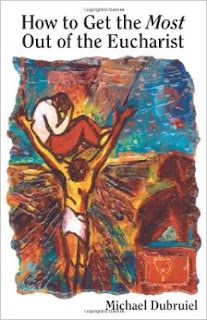From How to Get the Most Out of the Eucharist by Michael Dubruiel
About Michael Dubruiel
From Chapter 3 - Adore. Part 2
When Jesus came to visit the two sisters of Lazarus, the sister named Mary sat at Jesus’s feet and listened to him while the other sister, Martha, feverously worked in the kitchen to entertain their houseguest. Finally Martha came to Jesus and complained about the fact that Mary wasn’t helping her. Wandering minds, worriers, and a host of others don’t like what Jesus told Martha: “Martha, Martha, you are anxious and troubled about many things; one thing is needful.Mary has chosen the good portion, which shall not be taken away from her” (Luke 10:41–42).
I was discussing the topic of this book with a priest and he told me that in his many years of presiding at the Eucharist in churches around the world he thought that the organist was the most distracted member of almost every parish, “always fiddling with the music for the next piece, kind of a visual mind wandering.” It is easy to be caught up in worrying about doing a good job to the point that we forget why we are doing the job. Jesus tells the Martha in all of us, “One thing is needful.”
When we come to the Eucharist, are we adoring God, or worshipping something else?
GOD ALONE
Over the entrance to the cloister of the Abbey of Gethsemane in Kentucky are two simple words that are not simple at all in practice: God Alone. What really is necessary? God. What truly is worth worrying about? Our relationship with God.
Jesus said, “One thing is needful.”
If you want to get the most out of the Eucharist, adore God! Worship the One who can save you from whatever life may bring, even death!
When Jesus came to visit the two sisters of Lazarus, the sister named Mary sat at Jesus’s feet and listened to him while the other sister, Martha, feverously worked in the kitchen to entertain their houseguest. Finally Martha came to Jesus and complained about the fact that Mary wasn’t helping her. Wandering minds, worriers, and a host of others don’t like what Jesus told Martha: “Martha, Martha, you are anxious and troubled about many things; one thing is needful.Mary has chosen the good portion, which shall not be taken away from her” (Luke 10:41–42).
I was discussing the topic of this book with a priest and he told me that in his many years of presiding at the Eucharist in churches around the world he thought that the organist was the most distracted member of almost every parish, “always fiddling with the music for the next piece, kind of a visual mind wandering.” It is easy to be caught up in worrying about doing a good job to the point that we forget why we are doing the job. Jesus tells the Martha in all of us, “One thing is needful.”
When we come to the Eucharist, are we adoring God, or worshipping something else?
Over the entrance to the cloister of the Abbey of Gethsemane in Kentucky are two simple words that are not simple at all in practice: God Alone. What really is necessary? God. What truly is worth worrying about? Our relationship with God.
Jesus said, “One thing is needful.”
If you want to get the most out of the Eucharist, adore God! Worship the One who can save you from whatever life may bring, even death!



